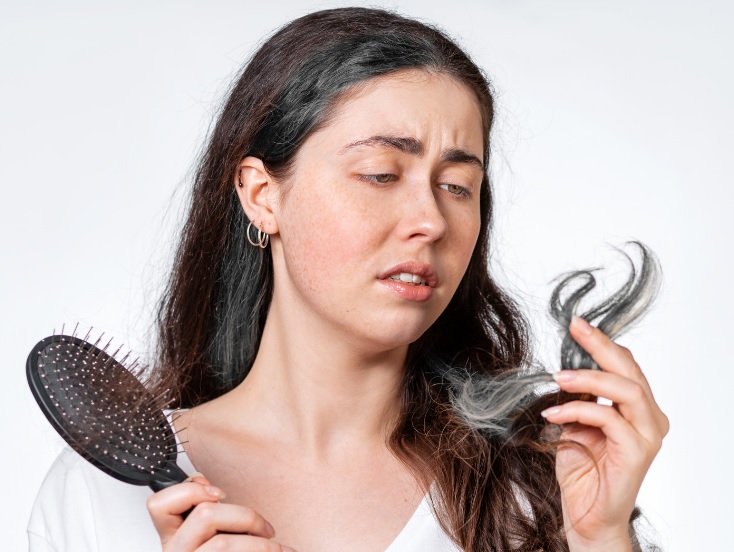
Why hair loss is particularly bad for women
Losing hair as a woman can be emotionally challenging and affect self-esteem in various ways:
Self-image
Hair often plays a significant role in how women perceive themselves. Losing hair can lead to feelings of loss and change in identity, impacting confidence and self-image.
Self-image holds significant importance to women for several reasons. Women often face societal pressures to meet certain beauty standards, which are closely tied to self-image. Feeling confident in their appearance can help women navigate social situations with greater ease and acceptance.
For many women, their self-image is intricately linked to their sense of identity. How they perceive themselves visually, emotionally, and socially contributes to their understanding of who they are as individuals.
A positive self-image is vital for mental health and emotional well-being. Women who struggle with negative self-image may experience higher levels of stress, anxiety, and depression, whereas those with a positive self-image tend to have better mental health outcomes.
Societal pressures
Society often places a high value on women’s appearance, including their hair. Losing hair can make women feel like they don’t meet societal standards of beauty, leading to feelings of inadequacy or insecurity.
Confidence in one’s self-image (hair in particular) can positively impact career success. Women who feel good about themselves are often more assertive, proactive, and willing to take risks, which can lead to greater opportunities and achievements. Great hair can often lead to more confidence.
Impact on relationships
Hair loss can affect relationships, especially intimate ones, as it may change how women feel about themselves and how they believe others perceive them. It can also lead to discomfort or anxiety about being seen without hair.
Hair loss is a much bigger concern for women than it is for men. It is normal to see men with thinning hair, but it comes across as less-normal to see a woman with thinning hair. This of course is just the common conception, because around two thirds of women experience hair loss by middle age.
Limited styling options
Hair loss can limit styling options, as women may struggle to find hairstyles that work with thinner hair or bald patches. This limitation can contribute to feelings of frustration and dissatisfaction with one’s appearance. Thinning hair can also make a women feel older and past her prime.
Medical concerns
In some cases, hair loss may be a symptom of an underlying medical condition. Dealing with both the physical effects of hair loss and the potential health concerns can be overwhelming and stressful.
Simple and effective ways to counter thinning hair
Countering female hair loss involves a combination of lifestyle changes, medical treatments, and self-care practices. Here are some strategies:
Consult a healthcare professional
If you’re experiencing hair loss, consult with a dermatologist or healthcare provider to determine the underlying cause. They can recommend appropriate treatments or lifestyle changes tailored to your specific situation.
Address underlying health issues
Hair loss can be a symptom of underlying health conditions such as hormonal imbalances, thyroid disorders, or nutritional deficiencies. Addressing these issues through medication, dietary changes, or supplements may help improve hair growth.
Nutritional support
Ensure you’re consuming a balanced diet rich in essential nutrients for hair health, including vitamins A, C, D, E, B vitamins, iron, zinc, and protein. Consider incorporating foods such as eggs, fish, nuts, seeds, fruits, vegetables, and whole grains into your diet.
Manage stress
Chronic stress can contribute to hair loss, so finding effective stress management techniques such as meditation, yoga, deep breathing exercises, or therapy can be beneficial.
Gentle hair care
Avoid harsh hair treatments, excessive heat styling, tight hairstyles, and aggressive brushing or combing, as these can damage hair follicles and exacerbate hair loss. Use gentle, sulfate-free shampoos and conditioners formulated for thinning hair.
Scalp care
Keep your scalp clean and healthy by washing regularly with a mild shampoo and gently massaging the scalp to stimulate blood flow. Consider using products containing ingredients like minoxidil or peptides that promote hair growth.
Avoid smoking and alcohol
Both smoking and heavy alcohol consumption can negatively impact hair health and exacerbate hair loss. Quitting smoking and moderating alcohol intake may help improve hair growth.
Consider medical treatments
In some cases, medical treatments such as minoxidil (Rogaine), finasteride (Propecia), or low-level laser therapy may be recommended by healthcare professionals to promote hair regrowth. These treatments work best when started early in the hair loss process.
Hair restoration procedures
For more severe cases of hair loss, hair restoration procedures such as hair transplant surgery or scalp micropigmentation may be considered. These procedures should be performed by qualified professionals after careful consideration and consultation.
Support groups and counselling
Joining support groups or seeking counselling can provide emotional support and practical advice for coping with hair loss. Connecting with others who are experiencing similar challenges can help reduce feelings of isolation and boost self-esteem.
Summary
Remember that addressing female hair loss may require patience and persistence, as results may not be immediate. It’s essential to work closely with healthcare professionals to develop a personalised treatment plan that addresses your specific needs and concerns.



Leave a Reply